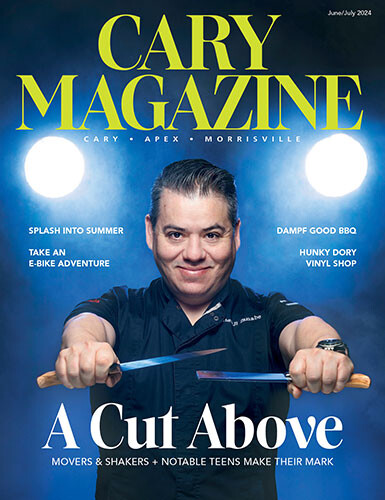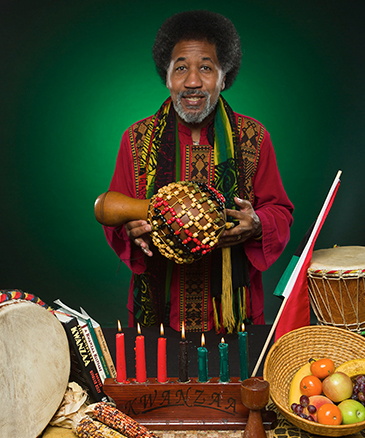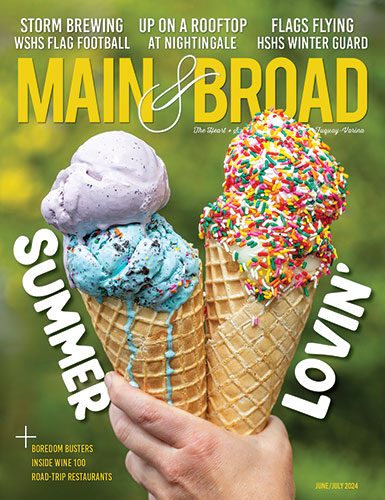Merry Christmas, Happy Hanukkah, Habari Gani.
You’re most familiar with that first greeting, no doubt, denoting the season of joy among millions of Christians worldwide as they celebrate the birth of Jesus.
So much more than Santa and reindeer, the true Christmas story celebrates a baby born in a manger, sent from God to redeem mankind. His birth is proclaimed by believers in every language, in hymns and carols, and by the star atop our Christmas trees.
While Christmas is the most beloved of seasons, we also note that as individuals and families from across the globe make their homes in Western Wake County, they bring other cultural, religious and holiday traditions.
Yet we all have this in common: Our holiday traditions are a time to reflect, celebrate and bring together our families, friends and communities.
Bright lights, colorful clothes, collaborative music and even some dancing — take a trip across Western Wake with us, for a global look at how friends and neighbors are celebrating too.

Darrell Stover of Cary celebrates Kwanzaa, the holiday honoring the cultures and traditions of people of African origin.
Kwanzaa
During the last week of December, instead of happy holidays you may hear “Habari gani” — or “What’s the news?”
It’s time for the African-American community to celebrate Kwanzaa. For seven days, friends and family will come together to revisit the seven principles, or Nguzo Saba, and celebrate with a feast and giftgiving.
“This time is about celebrating community and culture,” said Darrell Stover of Cary, a poet and cultural historian. “We come together to share stories and poetry, sing, dance or play African drums, and most importantly, reflect on our heritage and the seven principles: Unity, self-determination, collective work and responsibility, cooperative economics, purpose, creativity and faith.”
Serving as a way to become rooted in the African heritage and prepare for a new year, Kwanzaa originated in the U.S. in 1966 as the first specifically African-American holiday.

The lighting of candles symbolizing the “seven principles” is part of the Kwanzaa celebration.
“We celebrate Kwanzaa as a way to establish roots in our heritage and identity, and to build a greater sense of community as we move forward into the New Year,” Stover said.
Having been engaged in Kwanzaa celebrations since 1977, the events have become an essential tradition for Stover’s family. If he isn’t attending a celebration organized in the home of friends or family, he’s at a community-wide event participating in a collaborative performance with his son and daughter.
“Celebrating Kwanzaa is a mainstay for our family. The creative experiences I get to share are the most personal and heartfelt,” Stover said. “My daughter will organize an African dance, and be accompanied by my son’s drums while I recite poetry. It’s a family experience that brings us together through our heritage.”
Kwanzaa will be celebrated from Dec. 26 through Jan. 1, with the 20th annual Cary Kwanzaa Celebration set for 5 p.m. Tuesday, Dec. 30, at the Cary Arts Center.

Sarah Wechsberg lights candles on a ceremonial menorah in honor of Hanukkah, an eight-day “Festival of Lights.” Traditions include cooking latkes, or potato pancakes, and playing dreidel, below.
Hanukkah
Each year, Jewish residents come together to celebrate their own Festival of Lights, an eight-day tradition that honors the history of the Maccabean Revolt, their victory over the Syrians, and the rededication of the Holy Temple.
As the Maccabees celebrated their triumph, there was only enough oil for one day of light, but to their surprise, it continued to burn for eight more days.
 Hanukkah is a joyful time for Jewish residents, giving them the opportunity to gather in celebration of their ancestors. Friends and family come together to cook, exchange candy and gifts, and even play dreidel.
Hanukkah is a joyful time for Jewish residents, giving them the opportunity to gather in celebration of their ancestors. Friends and family come together to cook, exchange candy and gifts, and even play dreidel.
The most recognizable icon of Hanukkah is the menorah, where one candle is lit for every day of light until all candles are brightly burning on the final day of celebration.
Sarah Wechsberg enjoys Hanukkah for bringing her family together each year.
“Hanukkah is a time for the whole community to come together in celebration of our Jewish culture,” she said. “My family gathers to make food, and I love how the house fills up with scents of oil and fried food. We grate potatoes, make a mix and fry it with oil to make latkes.”
Traditionally potato pancakes, or latkes, are fried in oil to celebrate the miraculous oil that lasted for eight days so long ago. Latkes are served during a Hanukkah meal with applesauce or sour cream. Wechsberg said some get creative with their latkes by using sweet potatoes or salmon to make the dish a gourmet treat.
This year, Hanukkah will be celebrated from Dec. 17-24. For information on local celebrations, visit The Jewish Federation of Raleigh-Cary website at shalomraleigh.org.

Yalin Xiong, principal of the Cary Chinese School, celebrates the Chinese New Year by eating dumplings and rice flour cakes, or niangao, to symbolize “higher and higher, one year after another.”
Chinese New Year
This February, Chinese residents will begin the Year of the Sheep with a Spring Festival celebration, known in the West as Chinese New Year.
Originally organized to celebrate family union, the traditions of the holiday draw from more than 4,000 years of history, and the festival is considered the most important holiday in Chinese culture.
Festivities traditionally run from Chinese New Year’s Eve, the last day of the last month of the Chinese lunar calendar, to the Lantern Festival on the 15th day of the first month, making this festival the longest in the Chinese calendar.
During what is also known as the Spring Festival Eve, friends and family come together to eat dinner and celebrate the occasion.
Yalin Xiong, principal of the Cary Chinese School, says traditions include decorating the home and eating dumplings, a favorite among several festivals throughout the year.
In Northern China, jiaozi, or dumplings, are eaten for breakfast to bid farewell to the old and usher in the new. Similarly, in the South, niangao — a New Year cake made of glutinous rice flour, signifies “higher and higher, one year after another.”
“It is just like Christmas — beautiful, happy and amazing,” Xiong said of celebrating the Chinese New Year with his family. “All of my memories of the Lantern Festival are great.”
The annual Chinese New Year celebration in the Triangle is organized by the Chinese-American Friendship Association of North Carolina. The event will be held in mid-February; visit cafanc.org for details.

Scenes from the 2013 Cary Diwali festival, celebrating the triumph of light over darkness and good over evil. Festival traditions include dancing, Indian foods, a bazaar and fireworks.
Diwali
Diwali, the Indian Festival of Lights, is a Hindu festival held each October to celebrate the triumph of light over darkness and good over evil.
The festival traditionally extends over five days, while the main festival night of Diwali coincides with the darkest new moon of the lunar calendar.
Diwali is considered a universal festival and is celebrated all across India, from north to south and east to west, says Neetu Rajpal, president of Hum Sub, an Indian-American organization that promotes awareness of cultural traditions.

Here in the Triangle, the final day of Diwali is celebrated with a day of cultural festivities held at Cary’s Koka Booth Amphitheatre.
Since 2001 Hum Sub, along with the Town of Cary, has organized the Cary Diwali event.
“This year marks our 14th year of a Diwali celebration in the Town of Cary,” Rajpal said. “It is an all-day event open and free for everyone, with cultural performances and Indian food served, and attendees can shop at the bazaar with clothes and handcrafts for sale.”
To honor the Festival of Lights, Cary Diwali closes the night with a grand finale fireworks show. The annual celebration is a popular occasion for Hindu residents and the public, and has grown tremendously in its 14 years, from 2,000 to 12,000 attendees.

This year, Diwali was celebrated in Cary on Oct. 18. For information on next year’s Cary Diwali event, visit humsub.net.






